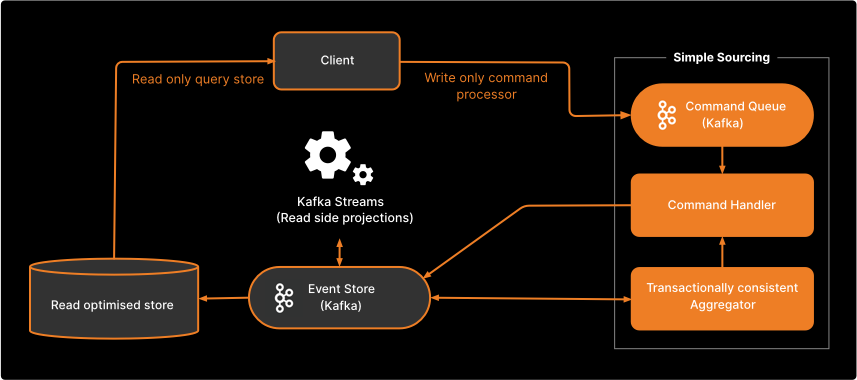With Simple Sourcing you are responsible for defining the domain model for your aggregates, the associated commands and events, and the functions for generating these entities.
Simple Sourcing provides an API for submitting these commands, and behind the scenes manages the persistence of the event store and any other state to Kafka.
Simple Sourcing also provides the guarantee that if a command is accepted, it will process it, generate one or more events and write them to the event log, and update the aggregate state in a single atomic operation. It also ensures that all events are written in the same order as the commands are received.

In the CQRS model implemented by Simple Sourcing, clients are able to submit commands to perform an action against aggregates each identified by a unique key.
The Command Handler is responsible for accepting these commands and validating them against a projection of the aggregate state. If it accepts the command, it generates one or more events to represent the changes made to the aggregate. These events are pushed into an Event Store, an append-only record of all the events applied to each aggregate.
One or more Projectors listen on the stream of events and build up a materialized view or projection of the aggregation.
Simple Sourcing is an opinionated API. We have made a couple of design decisions you need to be aware of:
- A single topic is used for the event store for each type of aggregate. The unique identifier of the aggregate is used as the key for the messages pushed into Kafka guaranteeing that inserting order will be preserved for all updates on a given aggregate.
- Publishing a command is an asynchronous operation. To guarantee ordering of updates into the event store we push commands through a topic in Kafka, allowing us to process all commands for a given key serially while still providing a highly performant, horizontally scalable solution.
- Simple Sourcing commands operate on single aggregate instances. To extend Simple Sourcing to transactions against multiple aggregates, we recommend Simple Sagas.